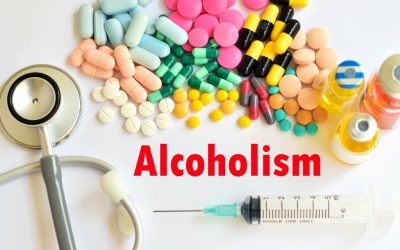They also resemble changes in the brain that precede dementia, Dr. Mosconi said. “Some of the brain regions that are impacted by menopause are also some of the regions impacted by Alzheimer’s disease,” she said, but the link between the two is not fully understood. There is no obligation to enter treatment and you can opt out at any time. She said there were steps everyone could take to improve brain health. There are lots of reasons why drinking too much alcohol on a regular basis is not a good idea. Of the 3,021 participants, 2,548 did not have MCI, and 473 did have MCI.

Firstly, the person is likely to need support to help them stop drinking alcohol. They may be given special prescription drugs to reduce their craving for alcohol. They will also need to take high-dose thiamine (vitamin B1) tablets and eat a healthy, balanced diet, and have counselling or ‘talking therapies’. It can be difficult to get an assessment, as some GPs will insist that the person has stopped drinking for several weeks before they can assess the person’s memory.
Side Effects of Alcohol Abuse
But we do know that drinking to this extent is likely to increase the risk of high blood pressure, diabetes, stroke and heart failure, which can also increase the risk of dementia. All we know is that they had alcohol use disorders which meant that their excessive drinking had become harmful and caused a serious health problem. Heavy drinkers are more likely to be smokers, have depression and lead unhealthy lives, which increases the risk of dementia. Alcohol addiction treatment options include outpatient and inpatient treatment.
Deep sleep, memory formation go hand-in-hand. Scientists are also … – Radio-Canada.ca
Deep sleep, memory formation go hand-in-hand. Scientists are also ….
Posted: Mon, 20 Nov 2023 20:28:15 GMT [source]
They may be treated with drugs that mimic the effect of alcohol on the brain to reduce withdrawal symptoms. The person will also be given fluids and salts, and high doses of thiamine (vitamin B1) by injection. The doctor will also do a full physical can alcoholism cause dementia examination and take a detailed history of the person’s symptoms and how they are affecting their life. They should also take an account from someone who knows the person well, as this can help if the person has gaps in their memory.
Alcoholic Dementia Life Expectancy
The effects of alcohol-related dementia may be reversible, depending on your circumstances. While the statistics can be intimidating, try to remember that they don’t determine your journey with ARD. Quality of life and life expectancy vary significantly from person to person.

Alcohol-induced dementia can be acquired if one gets intoxicated with alcohol regularly. This type of intoxication depletes the nutrients in the body, causes brain damage and seriously affects the function https://ecosoberhouse.com/article/what-to-do-if-the-person-you-love-is-an-addict/ of major organs such as liver, kidneys, pancreas, and more. Each person’s body can handle alcohol intoxication differently, but ultimately too much alcohol can lead to serious health conditions.
Wernicke Korsakoff Syndrome
Overall, the level of evidence and the methodological quality of the reviews were judged to be only moderate (for a systematic evaluation of the reviews, see [23, 28]). Reviews or meta-analyses were included if they described the systematic search process with listed databases and search terms. In addition, included studies were restricted to systematic reviews that assessed the relationship between alcohol use and cognitive health, dementia, AD, vascular and other dementias, brain function, or memory. Systematic reviews on the association between alcohol use and brain structures were also included.
- This can take several weeks, and you may need to do this under medical supervision.
- Thiamine deficiency is common among people with alcohol use disorder, which is a problem because nerve cells require thiamine to function properly.
- With dementia predicted to affect 13.9 million adults in the United States by 2060, understanding why these conditions develop is more urgent than ever.
Some people may develop behavioral symptoms or problems with memory and decision-making before experiencing motor effects of alcoholic dementia, but the pattern of symptoms doesn’t necessarily follow a particular sequence. Not everybody who consumes excessive amounts of alcohol for long periods of time develops dementia. But there is no way to predict whether a person who consumes large amounts of alcohol will develop alcoholic dementia or not. Wernicke-Korsakoff syndrome occurs due to a deficiency in vitamin B1 or thiamine. This is a common deficiency in people who misuse alcohol, but it can also occur due to other disorders or conditions.
Alcohol-Related Dementia and Wernicke-Korsakoff Syndrome
It’s important to consider a person’s current abilities and to monitor for changes over time that could signal dementia. Physical inactivity presents a greater risk for neurodegenerative diseases in women than in men, Dr. Caldwell said. And women throughout their lives, on average, are twice as likely to be physically inactive than men,” she said.
- Alcoholic dementia can occur at any age, and it is expected to worsen rapidly (within a few years) after the initial symptoms begin.
- If a doctor is unaware of the person drinking too much alcohol over many years, they may not consider alcohol-related ‘dementia’ as a possible diagnosis.
- But he said the Lancet research did not change the current advice and did not suggest that moderate alcohol intake could cause early-onset dementia.
- These symptoms can include denial, lack of insight and being impulsive.
- In addition, we examined whether cardiometabolic disease modifies the association between alcohol consumption and dementia.
The doctor may also ask about problems with mood, such as anxiety or depression. A person with alcohol-related ‘dementia’ may also have problems with their memory. They might not be able to understand new information – for example, they may quickly forget the details of a conversation. They may also not be able to recall knowledge and events, such as where they lived previously or places where they have been on holiday. Find out about Alcohol-related ‘dementia’ including symptoms, diagnosis, treatment, support and rehabilitation.

Comentarios recientes